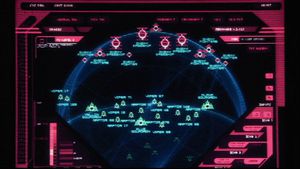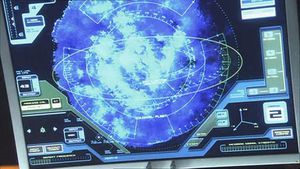DRADIS: Difference between revisions
More languages
More actions
No edit summary |
m Text replacement - "Kara Thrace" to "{{callsign|Starbuck}}" |
||
| (61 intermediate revisions by 21 users not shown) | |||
| Line 1: | Line 1: | ||
{{ | {{disline|For the [[Original Series]] counterpart, see [[scanner|Scanner]].}} | ||
'''DRADIS''' ('''''D'''irection, '''RA'''nge, and '''DIS'''tance'')<ref>Breakdown of the term is taken from an early manuscript of the first half of the Miniseries. For more information, please see "Notes".</ref> is a series of highly sensitive detection, identification, navigation and tracking systems used to determine the range, altitude, direction, or speed of objects. It can be used to detect aircraft, spacecraft, weapons ordnance, celestial bodies, and terrain. <ref>It appears that DRADIS is the Colonial equivalent of RADAR ('''''RA'''dio '''D'''etection '''A'''nd '''R'''anging'') here on Earth, but does not use that term. However, in "[[The Hand of God (RDM)|The Hand of God]]," some viewers believed that Lt. {{callsign|Starbuck}} said, "The decoy ships will jump into the enemy star system at extreme ''radar'' range from the Cylon asteroid." The use of "radar" would be a [[Continuity errors (RDM)|continuity error]] as official sources confirmed that "radar" does not exist in the Re-imagined Series. Others believed that actress [[Katee Sackhoff]] said "extreme ''Raider'' range," the range of the Raiders from the Cylon base, and the word was slurred so that it sounded vaguely like "radar". The matter was put to rest when Battlestar Wiki [[Battlestar Wiki:Official Communiques/Archive1#.22Radar.22_gaffe_in_.22The_Hand_of_God.22.3F|asked]] the writer of this episode, [[Bradley Thompson]], who confirmed that the line in the script was "...extreme ''Viper'' range...". The final line must have been looped in during post-production without his input (probably to keep from spoiling the plot). Thompson confirmed that the final line sounded like "Raider".</ref> | |||
DRADIS ('''D'''irection, '''RA'''nge, and '''DIS'''tance) is a detection, identification and tracking | |||
DRADIS | [[File:DRADIS Closeup.jpg|thumb|A DRADIS screen displays numerous friendly (green) and hostile (red) contacts.]] | ||
=== Operations === | |||
DRADIS is a central component of the navigation computer, and defensive and offensive weapons systems, especially on Colonial warships that do not have windows or portholes of any kind that would allow an outside view of the vessel. Without it, the warship is blind. It is the first line of defense after enemy contact is made, alerting warship crews to any incoming danger, such as nuclear (which triggers the ship's [[radiological alarm|Radiological Alarm]]) ([[TRS]]: "[[33]]," "[[The Captain's Hand]]") or conventional ordnance {{TRS|He That Believeth in Me}}, and any objects that might pose a collision risk ("[[CBDR]]" - '''''C'''onstant '''B'''earing, '''D'''ecreasing '''R'''ange'') {{TRS|Pegasus (episode)}}. Tactical and navigation data acquired from DRADIS scans are displayed on a series of screens that form the [[DRADIS console]], suspended above the [[CIC]]'s Command and Control console ([[TRS]]: "[[Miniseries]]," ''et al''). | |||
A | === Limitations and Interference === | ||
[[File:DRADIS Interference.jpg|thumb|A DRADIS readout is hindered by large amounts of external interference.]] | |||
DRADIS systems are often subject to various sources of interference, and clutter. These can come from excessive contacts or naturally occurring objects such as nebulas, EM interference, star clusters, pulsars, and binary stars. There isn't much an operator can do to eliminate these sources, and must do the best they can given the circumstances. However, DRADIS systems can still eliminate these sources enough to detect objects at closer ranges {{TRS|Lay Down Your Burdens, Part II}}. DRADIS operators can also "turn off" various sources of clutter, for example, excessive or uninteresting contacts can be toned down to simply an icon on the screen, allowing more important contacts, such as a ship's [[CAP|Combat Air Patrol]], or enemy contact, to be highlighted with its speed, direction, and [[IFF|transponder ID]]. | |||
Carbon composites can also absorb and diffuse DRADIS scans, rending any vehicle comprised of such material largely invisible. One such vehicle, the ''[[Blackbird]]'', was able to fly through and photograph a Cylon fleet tracking the battlestar ''{{RDM|Galactica}}'' without being noticed {{TRS|Flight of the Phoenix}}. Conversely, false positive contacts can be induced through electronic interference or malfunction, producing contacts that either misrepresent their actual configuration or do not actually exist. In the case of the latter, such false positives are referred to as "ghosts" {{TRS|Exodus, Part II|The Oath}}. | |||
DRADIS is | === Cylon DRADIS === | ||
The [[Cylons (RDM)|Cylons]] also employ DRADIS on their spacecraft, however, in what capacity is not known. No visual representation of the Cylon DRADIS exists, as the corresponding tracking data appears to be uploaded directly into the consciousnesses of the Cylons in charge of command and control via the Baseship [[datastream]] {{TRS|The Ties That Bind}}. | |||
{{clear}} | |||
== Notes == | == Notes == | ||
The "'''D'''irection, '''RA'''nge, and '''DIS'''tance" breakdown of the acronym "DRADIS" was listed in an early manuscript of the first half of the [[Miniseries]]. Since some major elements of this script were changed (such as Kobol being the sole home of the Colonies, and not separate worlds) in comparison to the completed teleplay, canonical use of this breakdown should be taken with some skepticism. | |||
There is some evidence to suggest that the original breakdown is the canonical version. In "[[Kobol's Last Gleaming, Part I]]," Lt. [[Alex Quartararo|Alex "Crashdown" Quartararo]] performs a DRADIS sweep of {{RDM|Kobol}}. The aerial survey is later presented to the [[Laura Roslin|President]]. For a brief moment, as Roslin takes the survey image out of [[Billy Keikeya]]'s hand, the DRADIS information printed on the image is [http://www.frak-that.com/112/images/112_cap309.jpg visible] (Bottom right). The letters on the image are clear and are as follows: | |||
:Aerial Survey | :Aerial Survey | ||
D. 41376 | :'''D.''' 41376 | ||
Ra. 145.8 | :'''Ra.''' 145.8 | ||
Dis. 43.5 | :'''Dis.''' 43.5 | ||
The letters represent numerical values. While this is not conclusive evidence, it is consistent with the original manuscript definition. | |||
* | ==See Also== | ||
*[[List of terms (RDM)|List of terms in the Re-imagined Series]] | |||
==References== | |||
{{reflist}} | |||
== References == | |||
[[Category:A to Z]] | [[Category:A to Z]] | ||
[[Category:Technology]] | [[Category:Technology]] | ||
[[Category:Technology (RDM)]] | |||
[[Category:Terminology]] | [[Category:Terminology]] | ||
[[Category:Terminology (RDM)]] | |||
[[Category:RDM]] | |||
[[de:DRADIS]] | |||
[[fr:DRADIS]] | |||
Latest revision as of 18:12, 30 June 2025
For the Original Series counterpart, see Scanner.
|
DRADIS (Direction, RAnge, and DIStance)[1] is a series of highly sensitive detection, identification, navigation and tracking systems used to determine the range, altitude, direction, or speed of objects. It can be used to detect aircraft, spacecraft, weapons ordnance, celestial bodies, and terrain. [2]

Operations
editDRADIS is a central component of the navigation computer, and defensive and offensive weapons systems, especially on Colonial warships that do not have windows or portholes of any kind that would allow an outside view of the vessel. Without it, the warship is blind. It is the first line of defense after enemy contact is made, alerting warship crews to any incoming danger, such as nuclear (which triggers the ship's Radiological Alarm) (TRS: "33," "The Captain's Hand") or conventional ordnance (TRS: "He That Believeth in Me"), and any objects that might pose a collision risk ("CBDR" - Constant Bearing, Decreasing Range) (TRS: "Pegasus"). Tactical and navigation data acquired from DRADIS scans are displayed on a series of screens that form the DRADIS console, suspended above the CIC's Command and Control console (TRS: "Miniseries," et al).
Limitations and Interference
edit
DRADIS systems are often subject to various sources of interference, and clutter. These can come from excessive contacts or naturally occurring objects such as nebulas, EM interference, star clusters, pulsars, and binary stars. There isn't much an operator can do to eliminate these sources, and must do the best they can given the circumstances. However, DRADIS systems can still eliminate these sources enough to detect objects at closer ranges (TRS: "Lay Down Your Burdens, Part II"). DRADIS operators can also "turn off" various sources of clutter, for example, excessive or uninteresting contacts can be toned down to simply an icon on the screen, allowing more important contacts, such as a ship's Combat Air Patrol, or enemy contact, to be highlighted with its speed, direction, and transponder ID.
Carbon composites can also absorb and diffuse DRADIS scans, rending any vehicle comprised of such material largely invisible. One such vehicle, the Blackbird, was able to fly through and photograph a Cylon fleet tracking the battlestar Galactica without being noticed (TRS: "Flight of the Phoenix"). Conversely, false positive contacts can be induced through electronic interference or malfunction, producing contacts that either misrepresent their actual configuration or do not actually exist. In the case of the latter, such false positives are referred to as "ghosts" (TRS: "Exodus, Part II" and "The Oath").
Cylon DRADIS
editThe Cylons also employ DRADIS on their spacecraft, however, in what capacity is not known. No visual representation of the Cylon DRADIS exists, as the corresponding tracking data appears to be uploaded directly into the consciousnesses of the Cylons in charge of command and control via the Baseship datastream (TRS: "The Ties That Bind").
Notes
editThe "Direction, RAnge, and DIStance" breakdown of the acronym "DRADIS" was listed in an early manuscript of the first half of the Miniseries. Since some major elements of this script were changed (such as Kobol being the sole home of the Colonies, and not separate worlds) in comparison to the completed teleplay, canonical use of this breakdown should be taken with some skepticism.
There is some evidence to suggest that the original breakdown is the canonical version. In "Kobol's Last Gleaming, Part I," Lt. Alex "Crashdown" Quartararo performs a DRADIS sweep of Kobol. The aerial survey is later presented to the President. For a brief moment, as Roslin takes the survey image out of Billy Keikeya's hand, the DRADIS information printed on the image is visible (Bottom right). The letters on the image are clear and are as follows:
- Aerial Survey
- D. 41376
- Ra. 145.8
- Dis. 43.5
The letters represent numerical values. While this is not conclusive evidence, it is consistent with the original manuscript definition.
See Also
editReferences
edit- ↑ Breakdown of the term is taken from an early manuscript of the first half of the Miniseries. For more information, please see "Notes".
- ↑ It appears that DRADIS is the Colonial equivalent of RADAR (RAdio Detection And Ranging) here on Earth, but does not use that term. However, in "The Hand of God," some viewers believed that Lt. Kara "Starbuck" Thrace said, "The decoy ships will jump into the enemy star system at extreme radar range from the Cylon asteroid." The use of "radar" would be a continuity error as official sources confirmed that "radar" does not exist in the Re-imagined Series. Others believed that actress Katee Sackhoff said "extreme Raider range," the range of the Raiders from the Cylon base, and the word was slurred so that it sounded vaguely like "radar". The matter was put to rest when Battlestar Wiki asked the writer of this episode, Bradley Thompson, who confirmed that the line in the script was "...extreme Viper range...". The final line must have been looped in during post-production without his input (probably to keep from spoiling the plot). Thompson confirmed that the final line sounded like "Raider".
